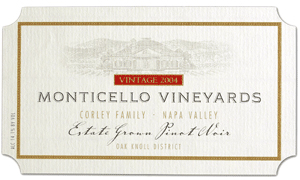

Monticello Vineyards|Corley Family Napa Valley
2006 Corley Pinot Noir, Estate(Oak Knoll District of Napa Valley)
The Corley family’s Monticello Vineyard in the Oak Knoll District just outside the city of Napa, is about the farthest north in the Napa Valley that one can find good Pinot Noir grown these days. That’s because the district is still cool enough to produce this tender variety that is so susceptible to the capriciousness of the climate, and craves a cooler vineyard.
So, what we have here is a round, elegant, deep-flavored Pinot with substantial texture and wonderful fruit with complex notes. The wine, with a lot of depth, is perhaps one of the closest any Napa Valley producer has come to making a Burgundian-like Pinot Noir.
The source of the fruit came from two blocks of the Monticello vineyard planted to five different Dijon clones – the material of choice for Pinot Noirs made outside of Burgundy. The wine was aged in French barrels for 16 months. The stated alcohol is 14.2 percent and there were 1,750 cases produced.
Reviewed March 26, 2008 by Alan Goldfarb.
Other reviewed wines from Monticello Vineyards|Corley Family Napa Valley
|
Monticello Vineyards|Corley Family Napa Valley 2005 Syrah (Oak Knoll District of Napa Valley)Alan Goldfarb 1/16/2008 |
The Wine
Winery: Monticello Vineyards|Corley Family Napa Valley |
The Reviewer Alan Goldfarb
Alan Goldfarb
Alan Goldfarb has been writing about and reviewing wine for 17 years. His reviews have been published in the St. Helena Star, San Jose Mercury, San Francisco Examiner, Decanter, and Wine Enthusiast, among others. Not once has he used a point system, star system, or an iconic symbol to quantify a wine. What counts in Mr. Goldfarb’s criteria when judging a wine is: how it tastes in the glass; is it well-constructed; its food compatibility; and presence of redeeming regional attributes. |















